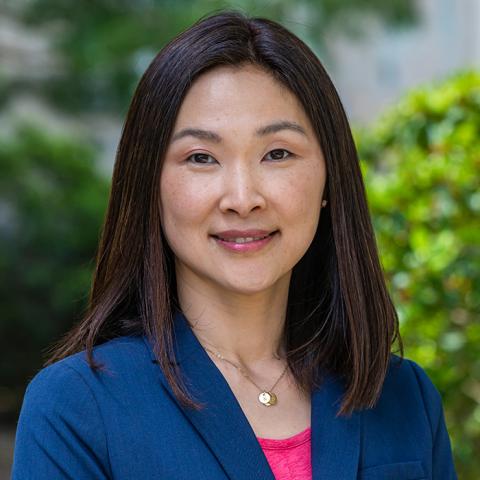Education
B.A., Barnard College, Columbia University (Psychology and Anthropology)
M.A. and Ph.D., University of California, Los Angeles (Clinical Psychology)
Clinical Predoctoral Internship, West Los Angeles Veterans Affairs Medical Center
Clinical Postdoctoral Residency, Center for Cognitive Therapy, Department of Psychiatry, University of Pennsylvania Perelman School of Medicine
About Me (in a nutshell)
I'm a cultural-clinical psychologist and have been on faculty in the Department of Psychology at Haverford College since 2012 (and served as Chair of the department 2022-2025). I teach courses in clinical psychology (Stress and Coping, Clinical Psychology Practicum) and cultural psychology (Cultural Psychology, Asian American Psychology). I helped to found the Tri-College Asian American Studies Program at Haverford, Bryn Mawr, and Swarthmore Colleges in 2022, and served as Co-Director during the inaugural years of the program (2022-2025). I am a licensed psychologist in clinical practice serving the community, and I am civically engaged in the Philadelphia suburbs.
I believe most strongly in the role of higher education as a social good, and the power of psychology (research, education, application, and intervention) to improve lives and communities.
In my spare time, I enjoy tea/coffee and a good book, outdoor runs/walks, listening to and making music, and spending time with my husband and three wonderful children.
To learn more about me, please visit my website here.
Research
My research interests are in the areas of stress and coping, social interaction, and health and well-being in the context of families and relationships. My research primarily uses a cultural framework to understand how cultural values regarding relationships and emotion processes predict social behavior, health, and well-being, with a focus on Asian and Latine groups in the U.S. and abroad. More recently, I have been studying racial-ethnic identity and intergroup processes in Asian American young people. I also study the stress and coping experiences of first generation college students and the transition to college. I employ quantitative, qualitative, and mixed methods approaches in my research.
Selected Publications:
Zhu, C., Chun, A., Shin, E., & Wang, S. (in press). Youth-directed racial-ethnic socialization and family processes in Asian immigrant families. Asian American Journal of Psychology.
Liu, L., Wang, S., Park, H., & Fung, J. (in press). Asian American and Pacific Islander families. In N. Tewari, A. Alvarez, and M. Fu (Eds.) Asian American Psychology: Current Perspectives, 2nd ed. New York: Routledge.
Benjamin, L. R. & Wang, S. (2024). Coping, connection appraisal, and well-being during COVID-19 in the U.S., Japan, and Mexico. Frontiers in Psychology: Health Psychology, 15, 1420327.
Weisblum, M., Zhu, C., Ajila, T., & Wang, S. (2024). Social connectedness protects against the impact of adverse childhood experiences on first-year undergraduate adjustment. Emerging Adulthood, 12(6), 996-1009.
Benjamin, L. R. & Wang, S. (2022). One size doesn’t fit all: Forms of social technology differentially predict distress. Communication Research Reports, 39(2), 80-92.
Benjamin, L. R., Ni, X.-T., & Wang, S. (2021). Implicit support differs across five groups in the U.S., Taiwan, and Mexico. Cultural Diversity and Ethnic Minority Psychology, 27(4), 675-683.
Chang, J., Wang, S., Mancini, C., McGrath-Mahrer, B., & Orama de Jesus, S. (2020). The complexity of cultural mismatch in higher education: Norms affecting first-generation college students’ coping and help-seeking behaviors. Cultural Diversity and Ethnic Minority Psychology, 26(3), 280-294.
Wang, S., & Lau, A. S. (2018). Ethnicity moderates the benefits of perceived support and emotional expressivity on stress reactivity for Asian Americans and Euro Americans. Cultural Diversity and Ethnic Minority Psychology, 24(3), 363-372.
Wang, S., & Campos, B. (2017). Cultural experiences, social ties, and stress: Focusing on the HPA axis. In J. M. Causadias, E. H. Telzer, and N. A. Gonzales (Eds.) Handbook of Culture and Biology. New York: Wiley.
Wang, S., & Repetti, R. (2016). Who gives to whom?: Testing the support gap hypothesis with naturalistic observations of couple interactions. Journal of Family Psychology, 30(4), 492-502.
Wang, S., & Lau, A. S. (2015). Mutual and non-mutual social support: Cultural differences in the psychological, behavioral, and biological effects of support-seeking. Journal of Cross-Cultural Psychology, 46(7), 916-929.
Wang, S., & Repetti, R. L. (2014). Psychological well-being and job stress predict marital support - A naturalistic observation study of dual-earner couples in their homes. Journal of Personality and Social Psychology, 107(5), 864-878.
Wang, S., Repetti, R. L., & Campos, B. (2011). Job stress and family social behavior - The moderating role of neuroticism. Journal of Occupational Health Psychology, 16(4), 441-456.
Wang, S., Shih, J. H., Hu, A. W., Louie, J. Y., & Lau, A. S. (2010). Cultural differences in daily support experiences. Cultural Diversity and Ethnic Minority Psychology, 16(3), 413-420.
